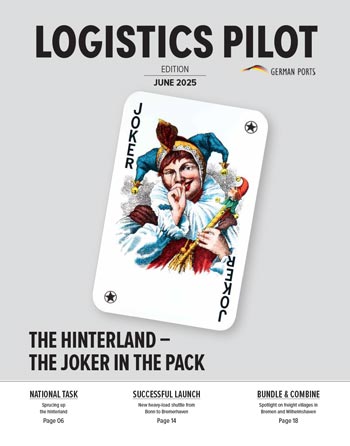Vollers imports tea from growing countries like China, India, Sri Lanka and Japan for its customers, before a portion of this is exported back out into the world. The logistics specialists from Bremen have become an integral part of the German tea market. Paul Schrader, a Bremen-based mail order company specialising in tea, sends the product to the end customer.
Photos: iStock/AzmanL, VOLLERS GROUP (2)
A good harvest may be the most important thing to tea enthusiasts at first glance. However, reliable logistics are just as important. This is becoming more important as tea gains in popularity. Per capita consumption of black, green, herbal and fruit tea increased by about one litre, to a total of 68 litres, in 2019. Herbal and fruit teas now rank first at about 40 litres. But black and green tea also increased by 1.6 litres to a total of 28 litres. German consumers drank 47 billion cups of tea overall. This equates to a quantity of about 40,000 tonnes (67 per cent) of herbal and fruit tea, and 19,200 tonnes of black and green tea (33 per cent).
Bearing these figures in ind, it is clear what Bernd Jamin, Director of Tea at logistics service provider Vollers, means when he says, “We process one out of every four cups of tea.” A total of around 5,500 tonnes of tea are moved through and stored across approximately 18,000 square metres in Building 6 at Bremen’s Europahafen. “Our warehouse turns over about once per year,” says Jamin. “We imported around 4,500 tonnes in 2020, and last year more than 200 tonnes of tea mix were produced from that per month.”
After being plucked in the exporting countries’ tea gardens and packed into paper sacks, the tea is loaded onto pallets in containers. The tea is then transported through the import harbours in Bremerhaven, Wilhelmshaven and Hamburg, and most of it is sent to the Vollers warehouse in Bremen by lorry. “The containers also come from Hamburg by train,” says Jamin. Vollers not only takes care of organising the transport and storage, but also stocking, fine picking and mixing. For the latter, the company receives the respective recipes (and keeps them confidential, of course).
Triple sampling required
The sampling is not done at Vollers, but rather first by the tea dealers on site, such as local tea traders Kloth & Köhnken. It happens again before storage in Bremen, and once more before sale. “Because we work closely together, there’s an internal courier service for the samples,” says Jarmin. Only once these are approved do our clients sell the products.
One of these clients is Bremen-based mail order company Paul Schrader, which celebrated its 100th birthday on 3 May. Executive Director Michael Rolf is a tea connoisseur: “Most good green teas come from China and Japan,” he says. Yet the company is primarily known for its Darjeeling,
although the company does not have its own storage spaces for raw tea.
We’ve been working with our partners Vollers and Kloth & Köhnken for about 15 years now,” Rolf notes. And the mixing was outsourced twelve years ago. “At the time we needed new packing machines and got in touch with the Martinshof workshops here in Bremen, which are some of the largest and oldest in Germany. An extra machine was purchased just for us.” They now have numerous filling machines. Around 100 persons with disabilities mix and package not only tea, but also drinking chocolate, coffee and nuts for Paul Schrader. “There are a lot of work steps, mainly manual work,” Rolf explains.
Facts
Vollers Group
Founded: 1932
Field of business: Logistics services for tea, such as transport, import/export processing, storage logistics, handling and mixing
Location: Bremen (head office) and eleven other locations in eight European countries
Storage space: 500,000 square metres
Employees: 350 Europe-wide, 20 for tea
Facts
Paul Schrader
Founded: 1921
Fields of business: Shipping
Location: Weyhe near Bremen
Shipping volume: 250,000 parcels per year
Employees: 60
46,643 tonnes of black and green tea from 72 countries were imported into Germany in 2019. Around half (45 per cent), or 22,243 tonnes, were sent to 108 countries around the world, equating to an increase of one per cent.
Storage, mixing and shipping in Bremen
This means that Paul Schrader’s 8,500 square metre warehouse does not need storage space, but picking space. The mail order company can order its goods just in time, as it is only ten kilometres from Martinshof. “For example, it’s usually a europallet or Düsseldorfer half pallet,” says Rolf. “That’s ideal for us, of course.” But the manager is proud of something else entirely: “Together with Martinshof we have developed the ‘fair pakt’ seal that shows social commitment and can be found on all of our tea packaging.”
For some years now, Rolf has also offered other mail order companies fulfilment – meaning the processing of all mail order services. Major and minor online platforms are used to sell products. With foodhall.de, the company provides a special marketplace for selling tea and other specialties in addition to the webshop on its homepage.
The company has clearly been affected by the pandemic: With foodhall.de, the company provides a special marketplace for selling tea and other specialties in addition to the webshop on its homepage. “The batch usually came 14 days later.” But thankfully it did not get so critical that it disrupted business. “Our customers also know this and have shown they understand.” There were also no obstacles with regard to other materials, such as for packaging. “Rather, we’ve been grappling with Brexit because some batches have been caught up in customs. “The good thing is we were able to stock up on whatever was available in Germany at the time.” (cb)







